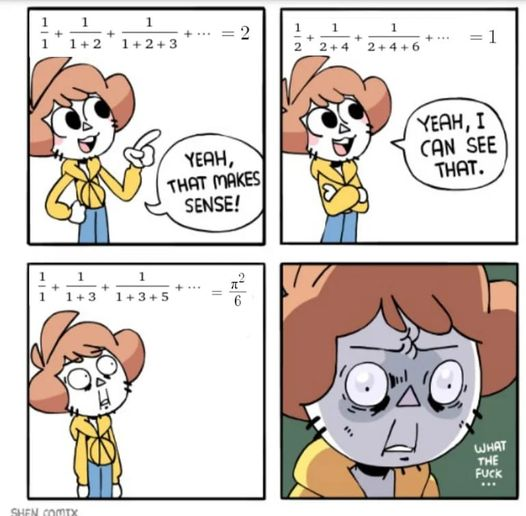this post was submitted on 11 Sep 2024
424 points (97.5% liked)
Science Memes
10923 readers
2234 users here now
Welcome to c/science_memes @ Mander.xyz!
A place for majestic STEMLORD peacocking, as well as memes about the realities of working in a lab.

Rules
- Don't throw mud. Behave like an intellectual and remember the human.
- Keep it rooted (on topic).
- No spam.
- Infographics welcome, get schooled.
This is a science community. We use the Dawkins definition of meme.
Research Committee
Other Mander Communities
Science and Research
Biology and Life Sciences
- [email protected]
- [email protected]
- [email protected]
- [email protected]
- [email protected]
- [email protected]
- [email protected]
- [email protected]
- [email protected]
- [email protected]
- [email protected]
- [email protected]
- [email protected]
- [email protected]
- [email protected]
- [email protected]
- [email protected]
- [email protected]
- [email protected]
- [email protected]
- [email protected]
- [email protected]
- [email protected]
- [email protected]
- !reptiles and [email protected]
Physical Sciences
- [email protected]
- [email protected]
- [email protected]
- [email protected]
- [email protected]
- [email protected]
- [email protected]
- [email protected]
- [email protected]
Humanities and Social Sciences
Practical and Applied Sciences
- !exercise-and [email protected]
- [email protected]
- !self [email protected]
- [email protected]
- [email protected]
- [email protected]
Memes
Miscellaneous
founded 2 years ago
MODERATORS
you are viewing a single comment's thread
view the rest of the comments
view the rest of the comments

1/(n * (n+1)) = 1/n - 1/(n+1)
1/(1 * 2) + 1/(2 * 3) + 1/(3 * 4) + ... = 1 - 1/2 + 1/2 - 1/3 + 1/3 - 1/4 + ... = 1
Written a bit more explicitly (although I kinda handwaved away the final term--the point is that you end up with one unpaired term which goes to zero)
edit: I was honestly confused about how exactly this related to the question, but seeing the comment from @[email protected] (not visible from Hexbear) which showed that the first sum in the image is equivalent to
the sum from n = 1 to ∞ of 2/(n * (n + 1))
made things clear (just take the above, put 2 in the numerator, and you get a result of 2)